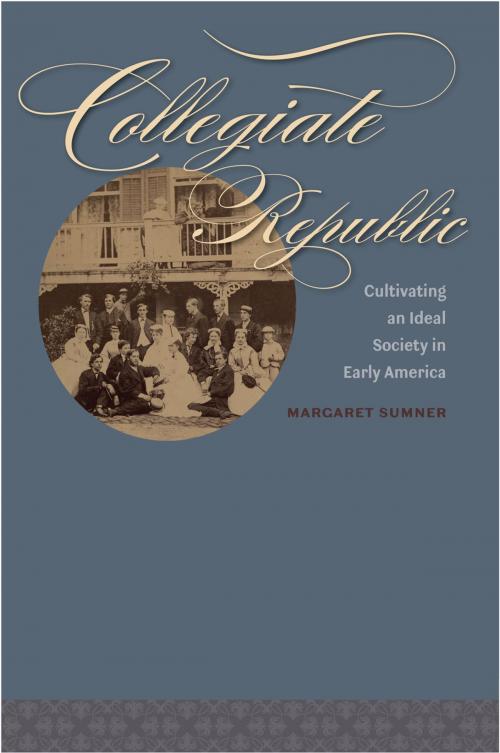Collegiate Republic
Cultivating an Ideal Society in Early America
Nonfiction, History, Americas, United States, Revolutionary Period (1775-1800)| Author: | Margaret Sumner | ISBN: | 9780813935683 |
| Publisher: | University of Virginia Press | Publication: | June 10, 2014 |
| Imprint: | University of Virginia Press | Language: | English |
| Author: | Margaret Sumner |
| ISBN: | 9780813935683 |
| Publisher: | University of Virginia Press |
| Publication: | June 10, 2014 |
| Imprint: | University of Virginia Press |
| Language: | English |
Collegiate Republic offers a compellingly different view of the first generation of college communities founded after the American Revolution. Such histories have usually taken the form of the institutional tale, charting the growth of a single institution and the male minds within it. Focusing on the published and private writings of the families who founded and ran new colleges in antebellum America--including Bowdoin College, Washington College (later Washington and Lee), and Franklin College in Georgia--Margaret Sumner argues that these institutions not only trained white male elites for professions and leadership positions but also were part of a wider interregional network of social laboratories for the new nation. Colleges, and the educational enterprise flourishing around them, provided crucial cultural construction sites where early Americans explored organizing elements of gender, race, and class as they attempted to shape a model society and citizenry fit for a new republic.
Within this experimental world, a diverse group of inhabitants--men and women, white and "colored," free and unfree--debated, defined, and promoted social and intellectual standards that were adopted by many living in an expanding nation in need of organizing principles. Priding themselves on the enlightened and purified state of their small communities, the leaders of this world regularly promoted their own minds, behaviors, and communities as authoritative templates for national emulation. Tracking these key figures as they circulate through college structures, professorial parlors, female academies, Liberian settlements, legislative halls, and main streets, achieving some of their cultural goals and failing at many others, Sumner's book shows formative American educational principles in action, tracing the interplay between the construction and dissemination of early national knowledge and the creation of cultural standards and social conventions.
Collegiate Republic offers a compellingly different view of the first generation of college communities founded after the American Revolution. Such histories have usually taken the form of the institutional tale, charting the growth of a single institution and the male minds within it. Focusing on the published and private writings of the families who founded and ran new colleges in antebellum America--including Bowdoin College, Washington College (later Washington and Lee), and Franklin College in Georgia--Margaret Sumner argues that these institutions not only trained white male elites for professions and leadership positions but also were part of a wider interregional network of social laboratories for the new nation. Colleges, and the educational enterprise flourishing around them, provided crucial cultural construction sites where early Americans explored organizing elements of gender, race, and class as they attempted to shape a model society and citizenry fit for a new republic.
Within this experimental world, a diverse group of inhabitants--men and women, white and "colored," free and unfree--debated, defined, and promoted social and intellectual standards that were adopted by many living in an expanding nation in need of organizing principles. Priding themselves on the enlightened and purified state of their small communities, the leaders of this world regularly promoted their own minds, behaviors, and communities as authoritative templates for national emulation. Tracking these key figures as they circulate through college structures, professorial parlors, female academies, Liberian settlements, legislative halls, and main streets, achieving some of their cultural goals and failing at many others, Sumner's book shows formative American educational principles in action, tracing the interplay between the construction and dissemination of early national knowledge and the creation of cultural standards and social conventions.















